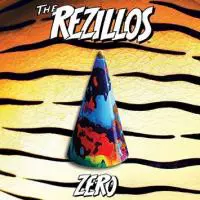The Rezillos formed in Edinburgh, Scotland in 1976. They were a legitimate first generation punk band, but even early on their sound tended toward what would later be considered new wave. They had both male and female vocals, and their music was more fun than political. While most bands were getting angry, they were getting weird. They released their sole LP in 1978, and broke up a few months later. Can't Stand The Rezillos is considered an early punk classic, and is still beloved nearly 40 years later.
Guitarist and principal songwriter Jo Callis would go on to have commercial success in the '80s with pop/new wave group The Human League (he wrote "Don't You Want Me," the band's biggest hit). Singers Eugene Reynolds and Faye Fife formed The Revillos, who continued in the style of The Rezillos until the mid-'80s. The Rezillos reformed in 2001 (without Callis) to play a Scottish festival, and have been playing off and on ever since, even releasing the occasional single. Now, 37 years after their last, comes Zero, a second long player.
It's always a little tricky to critically review a release like this. Zero will inevitably be judged by two standards:1. How good is it based on its own merits? 2. How does it compare to the band's classic material? To answer the first question, the album sounds great. The drums are driving, the bass is a little raunchy and the guitar is nice and loud in the mix. Reynolds' voice is raspy as ever, and Fife's is still strong and clear. The band is most often compared to The Cramps, Devo and The B-52's. The songs do tend to cover similar subject matter, but The Rezillos don't have keyboards, and are much more musically muscular. Fife's voice may remind you of the lovely ladies of The B-52's, but Reynolds is much more Jake Burns than Fred Schneider.
Opener "Groovy Room" is an upbeat party song with Reynolds on lead vocals. Fife takes the lead on "Number One Boy" and "Life's A Bitch," two driving punk tracks. They trade off on the main vocals, but both sing on every song. The Rezillos' aesthetic is always a little strange, but on "Tiny Boy" things finally start to get weird. "Tiny boy from outer space/How I love your flattened face" sounds like it's being transmitted by satellite over chugging, palm-muted guitar. Fife's voice sounds eerie, like it belongs in a David Lynch film. There are a couple of songs here about good old fashioned teenage (middle-aged?) lust, like "You're So Deep," "Animal" and "She's The Bad One." There's even a break-up song, "Sorry About Tomorrow."
The title track features robotic, spoken-word vocals over a great riff. Speaking of great riffs, this album has lots (37 years worth?) of them. They also cover all the song subjects that you would expect. "Nearly Human" is a classic science fiction tale. "Spike Heel Assassin" is an espionage story with familiar musical spy themes. The 12-track LP closes with "Out Of This World." It may be the perfect Rezillos' tune. It's a love song with an outer space metaphor. The band really just does what they're best at on Zero, they wrote great songs and didn't overthink things. This is vintage Rezillos with the advantage of modern recording technology.
So, to answer question number two, this holds up well when compared to Can't Stand The Rezillos. Obviously, they haven't been refining their sound for the last 37 years, but it's still astounding that they were able to pick up right where they left off. It's especially amazing when you consider that they were very young adults when they made the first record, and now they're, well, much older adults. While The Rezillos' sound hasn't changed much, the musical landscape around them has changed dramatically. Their once groundbreaking style has now been done by others a thousand times over. In 2015, The Rezillos will have to settle for making a very good album, and not a highly influential one.
